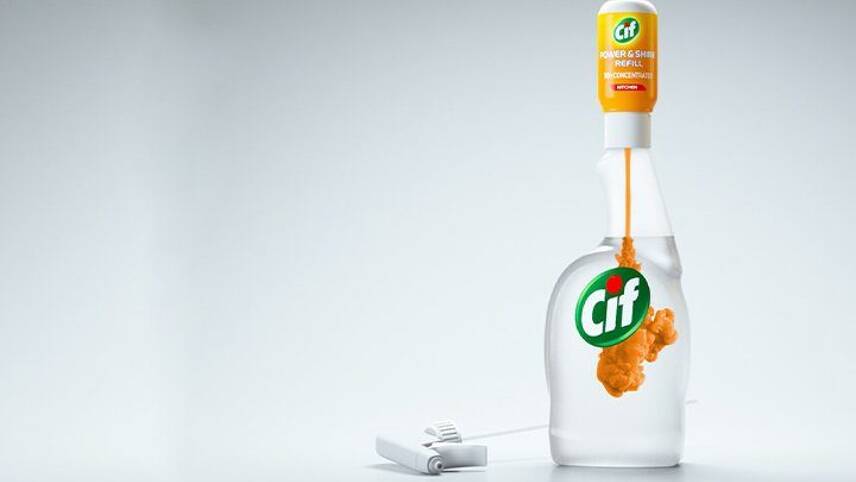Register for free and continue reading
Join our growing army of changemakers and get unlimited access to our premium content

'Ecorefills' are Unilever's latest foray into plastics-reducing innovations
That is according to the consumer goods giant’s vice president of homecare Gemma Cleland, who spoke exclusively with edie to discuss how its packaging and product innovations – including its Cif ‘ecorefill’ format – fit in with its revamped five-point plan for reducing plastics outputs.
Launched earlier this month, the ‘ecorefill’ format sees the trigger bottles of pre-diluted Cif Kitchen Power & Shine and Bathroom Power & Shine replaced with a pod containing 10x concentrate. The idea is for consumers to fill empty trigger bottles for either of these products with water, before attaching the ‘ecorefill’ pod to the neck and squeezing the contents in – a model which Unilever claims will help people to reuse trigger bottles “forever”.
Crucially, each of the ‘ecorefill’ pods is made using 75% less plastic, by weight, than an equivalent trigger bottle, and is designed to be recyclable in all UK kerbside collections.
While this model may seem simple at first glance, Cleland told edie that it took “several years” to develop, in an R&D project that included extensive research into whether consumers would be willing to change their behaviours in line with a refill model. Summarising the findings, Cleland explained that 85% of the UK adults Unilever surveyed said they wanted to buy products and packaging that could be reused.
“In fact, three in five people said that they believe reuse is even more important than recycling, so we believe UK consumers are ready to refill and reuse their homecare products,” she explained. “But we know from our own research that key barriers to reuse and refill exist in the market around awareness and concerns around price, mess and spillage.”
To that end, Unilever sought to design a product that retailed at the same price as its existing Cif Power & Shine lines – and one which would not be perceived as messy or hard-to-use by the general public. The result, after years of development, were product pods with a £2.50 price and the capability to attach directly to the neck of Unilever’s existing trigger bottles.
Behaviour change challenges and multi-pronged plans
The launch of the ‘ecorefills’ comes at a time when British retailers are increasingly realising the profitability of products which use refillable or reusable formats to tackle plastics, with Lush having recently launched its first “naked” store in the UK and Waitrose currently piloting packaging-free versions of hundreds of lines at one of its Oxford stores.
But given that refill models in the UK consumer goods and food and drink sectors are broadly only just beginning to gain traction at scale, away from independent grocery and lifestyle shops, Cleland acknowledged that Cif’s scale and position as a “trusted household name” would likely build consumer confidence in its “innovative new format”, giving Unilever the ideal platform to foray into an innovation which requires consumers to change behaviours.
Helping consumers to better understand what they can do to reduce plastic waste is one of the key focus areas of Unilever’s ‘Five Point Plastics Plan’ – a multi-pronged strategy detailing how the multinational will meet its WRAP UK Plastics Pact commitments for 2025. These include eliminating all “problematic or unnecessary” single-use packaging; ensuring all packaging is recyclable, compostable or reusable and achieving a 30% recycled content average across all plastics packaging.
The other four facets of Unilever’s ‘Five Point Plastics Plan’, launched earlier this year as a follow up to its previous three-pronged approach, are reducing plastic; switching to recyclable materials and recycled content; seeking alternatives to plastics and working in collaboration with partners across the value chain.
According to Cleland, innovation – both of products or packaging and systems as a whole – is a “key cornerstone” of all five of the Plan’s approaches.
“Innovations such as Cif ecorefills will significantly help towards achieving the aims of the Five Point Plastics Plan, as well as making a further significant contribution towards the UK Plastics Pact targets,” she said. “Innovation creates moments where we can reset and inspire, challenge the status quo.”
Cleland emphasised that, through innovations which contribute to multiple points listed in the plan, Unilever will additionally drive progress towards its overarching sustainability ambition of halving the environmental impact of all products by 2030. The Cif ‘ecorefill’ format, for example, requires 97% less water to be transported, lowering logistics-related emissions.
Elsewhere, Unilever’s recently unveiled ‘detectable’ black plastic pigment, currently being rolled out across its TRESemme and Lynx brands, could transform the meaning of the term “recyclable” for businesses across the plastics value chain, diverting black plastics from landfill and into new products, thus creating a more circular and less carbon-intense economy for the material.
According to WRAP’s member progress report on the Plastics Pact, other Unilever innovations due to be developed over the next 12 months include bottles made from 100% post-consumer recycled content for its Comfort Ultra Concentrated Fabric Conditioner and Cif Nature’s Recipe Kitchen and Bathroom. This year will also see perforated versions of existing shrink sleeves rolled out across the Unilever portfolio, in a bid to get customers to separate the rigid plastic containers from the sleeve for more effective recycling.
Sarah George


Please login or Register to leave a comment.